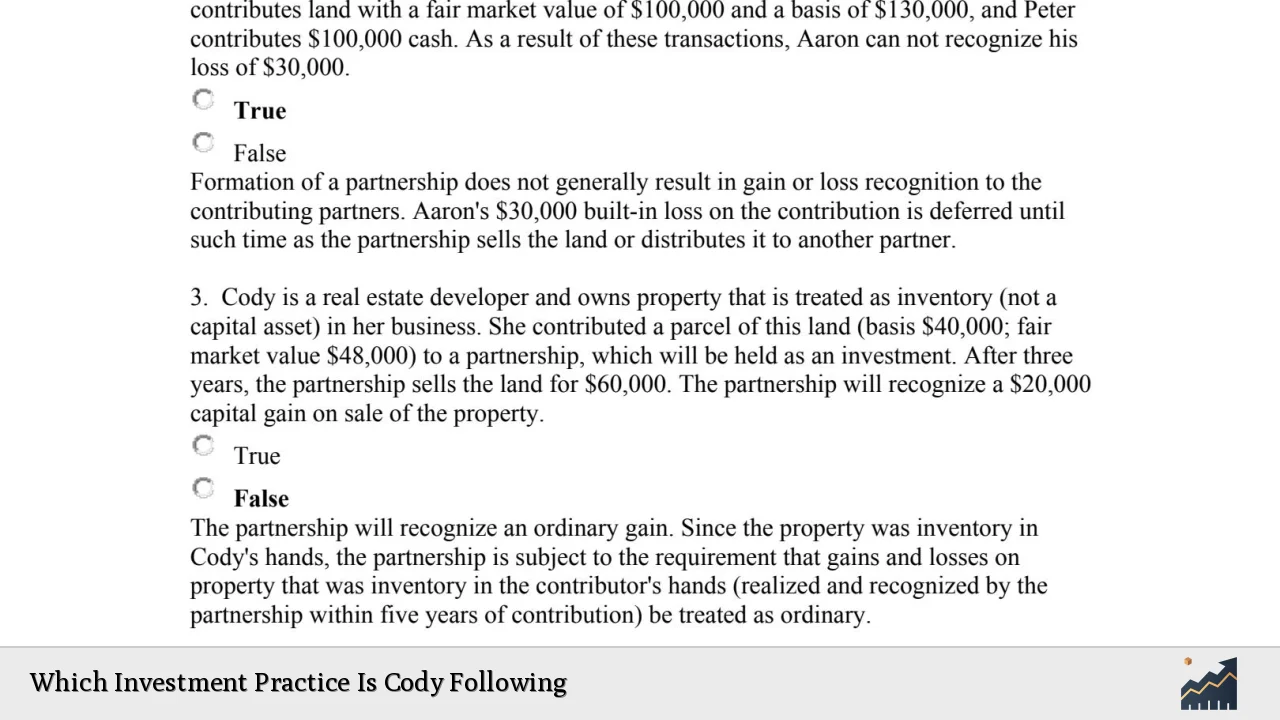Cody’s investment practice is rooted in value investing, a strategy that emphasizes buying undervalued stocks with strong fundamentals and holding them for the long term. This approach is characterized by a thorough analysis of a company’s intrinsic value, allowing investors to capitalize on price discrepancies in the market. Unlike other strategies that may focus on short-term gains or market trends, Cody’s method prioritizes the underlying worth of investments, which can lead to substantial returns over time.
Value investing involves several key components:
| Key Concept | Description/Impact |
|---|---|
| Intrinsic Value Analysis | Cody assesses companies based on their financial health, management quality, industry position, and competitive advantages to determine their true worth. |
| Market Timing | Value investors like Cody often ignore short-term market fluctuations, focusing instead on long-term potential and stability. |
| Diversification | Cody diversifies his portfolio across various sectors to mitigate risks associated with individual investments. |
| Patience and Discipline | This investment philosophy requires a long-term perspective, as value stocks may take time to appreciate in value. |
| Risk Management | Cody employs strategies to manage risk, ensuring that no single investment can significantly impact his overall portfolio. |
Market Analysis and Trends
In recent years, the investment landscape has shifted dramatically due to various economic factors. The Federal Reserve’s monetary policy, inflation trends, and geopolitical events have all influenced market dynamics. As of late 2024, analysts predict a more favorable environment for value investing due to anticipated interest rate cuts and a broader recovery in economic growth.
Current Market Statistics
- S&P 500 Performance: The index saw a substantial increase of approximately 19% in 2023, driven by multiple expansion and resilient earnings. However, projections for 2024 suggest more subdued growth as the economy adjusts to changing interest rates.
- Inflation Rates: Core Personal Consumption Expenditures (PCE) inflation is expected to stabilize around 2.5% by mid-2024, providing a conducive backdrop for value investments as borrowing costs decrease.
- Sector Performance: Value sectors such as financials and energy are poised for potential growth as deregulation and fiscal policies shift under new government leadership.
Implementation Strategies
Cody’s approach to implementing his investment strategy involves several critical steps:
- Research and Analysis: Conducting comprehensive analyses of potential investments through financial statements, market conditions, and industry trends.
- Stock Selection: Identifying stocks that are undervalued relative to their intrinsic value. This often includes companies facing temporary challenges that do not reflect their long-term potential.
- Portfolio Construction: Building a diversified portfolio that balances risk across different asset classes and sectors.
- Monitoring Investments: Regularly reviewing the performance of investments and the overall economic environment to adjust strategies as needed.
- Long-Term Holding: Maintaining positions in selected stocks for extended periods to allow for market corrections that align prices with intrinsic values.
Risk Considerations
While value investing can be rewarding, it is not without risks:
- Market Volatility: Economic downturns can affect even fundamentally strong companies, leading to short-term losses.
- Misjudging Value: There is always a risk that an investor may incorrectly assess a company’s intrinsic value or overlook fundamental issues.
- Liquidity Risks: Some undervalued stocks may be less liquid, making it challenging to sell without impacting the stock price.
To mitigate these risks, Cody emphasizes diversification across sectors and asset classes while maintaining a disciplined approach to stock selection.
Regulatory Aspects
Investors must also navigate various regulatory environments that can impact their investment strategies:
- Securities and Exchange Commission (SEC) Regulations: Compliance with SEC rules is crucial for all investors. Understanding these regulations helps mitigate legal risks associated with trading practices.
- Market Transparency: Regulatory changes aimed at increasing market transparency can benefit value investors by providing more reliable data for analysis.
- Compliance Costs: Firms must be prepared for potential increases in compliance costs due to evolving regulations aimed at protecting investors and ensuring market integrity.
Future Outlook
Looking ahead into 2025 and beyond, several trends are expected to shape the investment landscape:
- Interest Rate Adjustments: Analysts anticipate further rate cuts by the Federal Reserve if inflation continues its downward trajectory, which may create favorable conditions for equity markets.
- Emerging Markets: Increased interest in emerging markets as they recover from pandemic-related setbacks could present new opportunities for value investors like Cody.
- Technological Advancements: The integration of AI and data analytics in investment strategies will likely enhance decision-making processes and improve stock selection accuracy.
Overall, Cody’s adherence to value investing principles positions him well for navigating future market challenges while capitalizing on opportunities presented by economic shifts.
Frequently Asked Questions About Which Investment Practice Is Cody Following
- What is value investing?
Value investing is an investment strategy focused on identifying undervalued stocks based on their intrinsic worth rather than market trends. - How does Cody select stocks?
Cody selects stocks through rigorous analysis of financial health, management quality, competitive advantages, and prevailing industry trends. - What are the risks associated with value investing?
The main risks include market volatility, misjudging a company’s intrinsic value, and liquidity issues. - Why is diversification important in Cody’s strategy?
Diversification helps reduce risk by spreading investments across various sectors and asset classes. - How does regulatory compliance affect investment strategies?
Compliance with regulations ensures legal protection while promoting transparency in trading practices. - What is the expected market outlook for 2024?
The outlook suggests potential growth opportunities driven by anticipated interest rate cuts and improved economic conditions. - How can I learn more about value investing?
Consider reading books on value investing principles or following reputable financial analysts who specialize in this strategy. - Is professional advice recommended for new investors?
Yes, seeking professional advice can help navigate complex investment decisions and ensure adherence to sound investment practices.

